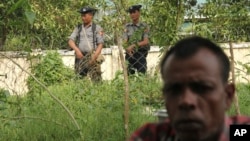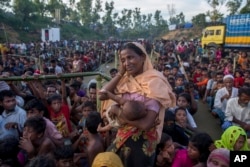Mass graves of dozens of slain Hindus have been found in Myanmar's troubled Rakhine state, according to government officials.
Social Welfare, Relief and Resettlement Minister Dr. Win Myat Aye told VOA’s Burmese Service he witnessed another 17 bodies recovered Monday, after 25 bodies were found in two mass graves a day earlier. Aye said most bodies were of women and children, many with their hands tied, and some which had been beheaded.
Aye and a police chief both told VOA Burmese they believe the bodies belong to more than 100 Hindus who have been missing for a month.
The military, which said it discovered two mud pits with 28 Hindu corpses Sunday outside the village of Ye Baw Kyaw in northern Rakhine, has blamed Rohingya "extremist terrorists" for the killings.
Violence in Myanmar's Rakhine state, which has caused more than 400,000 Rohingya Muslims to flee to Bangladesh and resulted in widespread claims of atrocities and ethnic cleansing, was a discussed frequently at the U.N. General Assembly last week.
VOA's Bangla Service spoke with Bangladesh Prime Minister Sheikh Hasina Saturday, who said that the concern of the international community is "one positive thing", though Bangladesh has been providing shelter to Rohingya who crossed the border without international support.
“Already we started by ourselves. We didn’t wait for anybody’s assistance. Whatever resources we have, we have already started giving them shelter, food..." she told VOA Bangla.
But she warned that more pressure must be put on Myanmar to take back their refugees.
"Yes, we have given them shelter, it is temporary. But Myanmar government should accept that they are their citizens and it is their duty to take them back and give them their, ensure them security and also give them their house and they should resettle these people," she said, adding that what the Myanmar government was doing was "barbaric".
Violence erupted there August 25, when a group of Rohingya militants attacked dozens of police posts and an army base in what they said was an effort to protect their ethnic minority from persecution.
About 400 people have been killed in subsequent clashes, and a military counteroffensive sent more than 400,000 people fleeing to neighboring Bangladesh.






